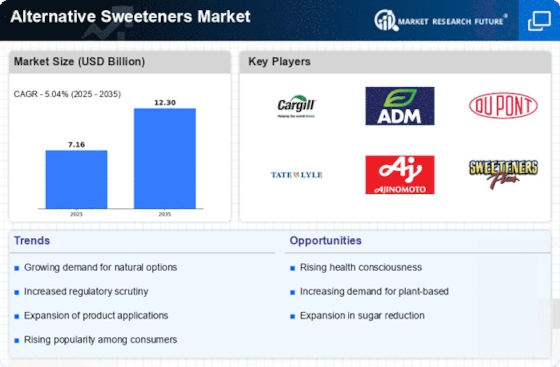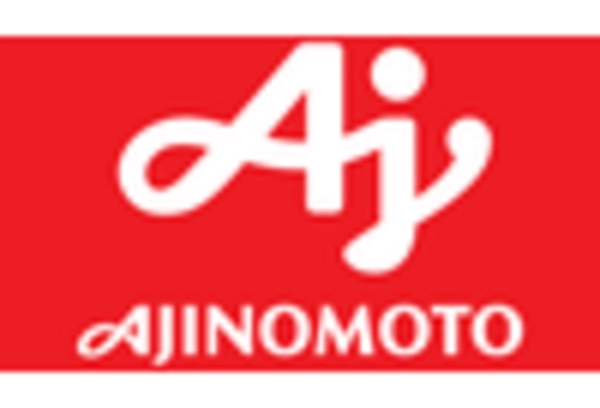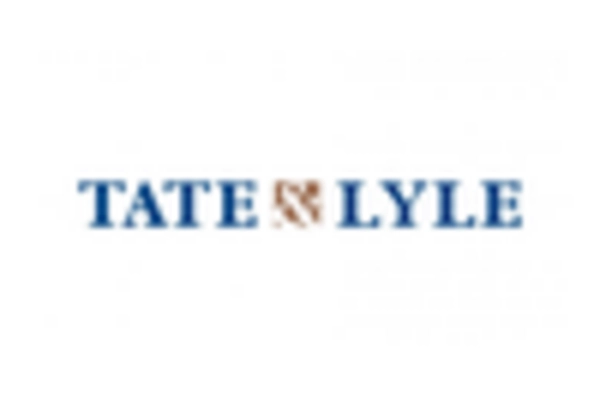Natural Sweeteners
Artificial Sweeteners
Sugar Alcohols
High-Intensity Sweeteners
Traditional Sweeteners
Food and Beverages
Pharmaceuticals
Cosmetics
Dietary Supplements
Liquid
Powder
Granulated
Tablet
Household
Commercial
Food Processing
Beverage Manufacturing
North America
Europe
South America
Asia Pacific
Middle East and Africa
North America Outlook (USD Billion, 2019-2035)
North America Alternative Sweeteners Market by Type
Natural Sweeteners
Artificial Sweeteners
Sugar Alcohols
High-Intensity Sweeteners
Traditional Sweeteners
North America Alternative Sweeteners Market by Application Type
Food and Beverages
Pharmaceuticals
Cosmetics
Dietary Supplements
North America Alternative Sweeteners Market by Form Type
Liquid
Powder
Granulated
Tablet
North America Alternative Sweeteners Market by End Use Type
Household
Commercial
Food Processing
Beverage Manufacturing
North America Alternative Sweeteners Market by Regional Type
US
Canada
US Outlook (USD Billion, 2019-2035)
US Alternative Sweeteners Market by Type
Natural Sweeteners
Artificial Sweeteners
Sugar Alcohols
High-Intensity Sweeteners
Traditional Sweeteners
US Alternative Sweeteners Market by Application Type
Food and Beverages
Pharmaceuticals
Cosmetics
Dietary Supplements
US Alternative Sweeteners Market by Form Type
Liquid
Powder
Granulated
Tablet
US Alternative Sweeteners Market by End Use Type
Household
Commercial
Food Processing
Beverage Manufacturing
CANADA Outlook (USD Billion, 2019-2035)
CANADA Alternative Sweeteners Market by Type
Natural Sweeteners
Artificial Sweeteners
Sugar Alcohols
High-Intensity Sweeteners
Traditional Sweeteners
CANADA Alternative Sweeteners Market by Application Type
Food and Beverages
Pharmaceuticals
Cosmetics
Dietary Supplements
CANADA Alternative Sweeteners Market by Form Type
Liquid
Powder
Granulated
Tablet
CANADA Alternative Sweeteners Market by End Use Type
Household
Commercial
Food Processing
Beverage Manufacturing
Europe Outlook (USD Billion, 2019-2035)
Europe Alternative Sweeteners Market by Type
Natural Sweeteners
Artificial Sweeteners
Sugar Alcohols
High-Intensity Sweeteners
Traditional Sweeteners
Europe Alternative Sweeteners Market by Application Type
Food and Beverages
Pharmaceuticals
Cosmetics
Dietary Supplements
Europe Alternative Sweeteners Market by Form Type
Liquid
Powder
Granulated
Tablet
Europe Alternative Sweeteners Market by End Use Type
Household
Commercial
Food Processing
Beverage Manufacturing
Europe Alternative Sweeteners Market by Regional Type
Germany
UK
France
Russia
Italy
Spain
Rest of Europe
GERMANY Outlook (USD Billion, 2019-2035)
GERMANY Alternative Sweeteners Market by Type
Natural Sweeteners
Artificial Sweeteners
Sugar Alcohols
High-Intensity Sweeteners
Traditional Sweeteners
GERMANY Alternative Sweeteners Market by Application Type
Food and Beverages
Pharmaceuticals
Cosmetics
Dietary Supplements
GERMANY Alternative Sweeteners Market by Form Type
Liquid
Powder
Granulated
Tablet
GERMANY Alternative Sweeteners Market by End Use Type
Household
Commercial
Food Processing
Beverage Manufacturing
UK Outlook (USD Billion, 2019-2035)
UK Alternative Sweeteners Market by Type
Natural Sweeteners
Artificial Sweeteners
Sugar Alcohols
High-Intensity Sweeteners
Traditional Sweeteners
UK Alternative Sweeteners Market by Application Type
Food and Beverages
Pharmaceuticals
Cosmetics
Dietary Supplements
UK Alternative Sweeteners Market by Form Type
Liquid
Powder
Granulated
Tablet
UK Alternative Sweeteners Market by End Use Type
Household
Commercial
Food Processing
Beverage Manufacturing
FRANCE Outlook (USD Billion, 2019-2035)
FRANCE Alternative Sweeteners Market by Type
Natural Sweeteners
Artificial Sweeteners
Sugar Alcohols
High-Intensity Sweeteners
Traditional Sweeteners
FRANCE Alternative Sweeteners Market by Application Type
Food and Beverages
Pharmaceuticals
Cosmetics
Dietary Supplements
FRANCE Alternative Sweeteners Market by Form Type
Liquid
Powder
Granulated
Tablet
FRANCE Alternative Sweeteners Market by End Use Type
Household
Commercial
Food Processing
Beverage Manufacturing
RUSSIA Outlook (USD Billion, 2019-2035)
RUSSIA Alternative Sweeteners Market by Type
Natural Sweeteners
Artificial Sweeteners
Sugar Alcohols
High-Intensity Sweeteners
Traditional Sweeteners
RUSSIA Alternative Sweeteners Market by Application Type
Food and Beverages
Pharmaceuticals
Cosmetics
Dietary Supplements
RUSSIA Alternative Sweeteners Market by Form Type
Liquid
Powder
Granulated
Tablet
RUSSIA Alternative Sweeteners Market by End Use Type
Household
Commercial
Food Processing
Beverage Manufacturing
ITALY Outlook (USD Billion, 2019-2035)
ITALY Alternative Sweeteners Market by Type
Natural Sweeteners
Artificial Sweeteners
Sugar Alcohols
High-Intensity Sweeteners
Traditional Sweeteners
ITALY Alternative Sweeteners Market by Application Type
Food and Beverages
Pharmaceuticals
Cosmetics
Dietary Supplements
ITALY Alternative Sweeteners Market by Form Type
Liquid
Powder
Granulated
Tablet
ITALY Alternative Sweeteners Market by End Use Type
Household
Commercial
Food Processing
Beverage Manufacturing
SPAIN Outlook (USD Billion, 2019-2035)
SPAIN Alternative Sweeteners Market by Type
Natural Sweeteners
Artificial Sweeteners
Sugar Alcohols
High-Intensity Sweeteners
Traditional Sweeteners
SPAIN Alternative Sweeteners Market by Application Type
Food and Beverages
Pharmaceuticals
Cosmetics
Dietary Supplements
SPAIN Alternative Sweeteners Market by Form Type
Liquid
Powder
Granulated
Tablet
SPAIN Alternative Sweeteners Market by End Use Type
Household
Commercial
Food Processing
Beverage Manufacturing
REST OF EUROPE Outlook (USD Billion, 2019-2035)
REST OF EUROPE Alternative Sweeteners Market by Type
Natural Sweeteners
Artificial Sweeteners
Sugar Alcohols
High-Intensity Sweeteners
Traditional Sweeteners
REST OF EUROPE Alternative Sweeteners Market by Application Type
Food and Beverages
Pharmaceuticals
Cosmetics
Dietary Supplements
REST OF EUROPE Alternative Sweeteners Market by Form Type
Liquid
Powder
Granulated
Tablet
REST OF EUROPE Alternative Sweeteners Market by End Use Type
Household
Commercial
Food Processing
Beverage Manufacturing
APAC Outlook (USD Billion, 2019-2035)
APAC Alternative Sweeteners Market by Type
Natural Sweeteners
Artificial Sweeteners
Sugar Alcohols
High-Intensity Sweeteners
Traditional Sweeteners
APAC Alternative Sweeteners Market by Application Type
Food and Beverages
Pharmaceuticals
Cosmetics
Dietary Supplements
APAC Alternative Sweeteners Market by Form Type
Liquid
Powder
Granulated
Tablet
APAC Alternative Sweeteners Market by End Use Type
Household
Commercial
Food Processing
Beverage Manufacturing
APAC Alternative Sweeteners Market by Regional Type
China
India
Japan
South Korea
Malaysia
Thailand
Indonesia
Rest of APAC
CHINA Outlook (USD Billion, 2019-2035)
CHINA Alternative Sweeteners Market by Type
Natural Sweeteners
Artificial Sweeteners
Sugar Alcohols
High-Intensity Sweeteners
Traditional Sweeteners
CHINA Alternative Sweeteners Market by Application Type
Food and Beverages
Pharmaceuticals
Cosmetics
Dietary Supplements
CHINA Alternative Sweeteners Market by Form Type
Liquid
Powder
Granulated
Tablet
CHINA Alternative Sweeteners Market by End Use Type
Household
Commercial
Food Processing
Beverage Manufacturing
INDIA Outlook (USD Billion, 2019-2035)
INDIA Alternative Sweeteners Market by Type
Natural Sweeteners
Artificial Sweeteners
Sugar Alcohols
High-Intensity Sweeteners
Traditional Sweeteners
INDIA Alternative Sweeteners Market by Application Type
Food and Beverages
Pharmaceuticals
Cosmetics
Dietary Supplements
INDIA Alternative Sweeteners Market by Form Type
Liquid
Powder
Granulated
Tablet
INDIA Alternative Sweeteners Market by End Use Type
Household
Commercial
Food Processing
Beverage Manufacturing
JAPAN Outlook (USD Billion, 2019-2035)
JAPAN Alternative Sweeteners Market by Type
Natural Sweeteners
Artificial Sweeteners
Sugar Alcohols
High-Intensity Sweeteners
Traditional Sweeteners
JAPAN Alternative Sweeteners Market by Application Type
Food and Beverages
Pharmaceuticals
Cosmetics
Dietary Supplements
JAPAN Alternative Sweeteners Market by Form Type
Liquid
Powder
Granulated
Tablet
JAPAN Alternative Sweeteners Market by End Use Type
Household
Commercial
Food Processing
Beverage Manufacturing
SOUTH KOREA Outlook (USD Billion, 2019-2035)
SOUTH KOREA Alternative Sweeteners Market by Type
Natural Sweeteners
Artificial Sweeteners
Sugar Alcohols
High-Intensity Sweeteners
Traditional Sweeteners
SOUTH KOREA Alternative Sweeteners Market by Application Type
Food and Beverages
Pharmaceuticals
Cosmetics
Dietary Supplements
SOUTH KOREA Alternative Sweeteners Market by Form Type
Liquid
Powder
Granulated
Tablet
SOUTH KOREA Alternative Sweeteners Market by End Use Type
Household
Commercial
Food Processing
Beverage Manufacturing
MALAYSIA Outlook (USD Billion, 2019-2035)
MALAYSIA Alternative Sweeteners Market by Type
Natural Sweeteners
Artificial Sweeteners
Sugar Alcohols
High-Intensity Sweeteners
Traditional Sweeteners
MALAYSIA Alternative Sweeteners Market by Application Type
Food and Beverages
Pharmaceuticals
Cosmetics
Dietary Supplements
MALAYSIA Alternative Sweeteners Market by Form Type
Liquid
Powder
Granulated
Tablet
MALAYSIA Alternative Sweeteners Market by End Use Type
Household
Commercial
Food Processing
Beverage Manufacturing
THAILAND Outlook (USD Billion, 2019-2035)
THAILAND Alternative Sweeteners Market by Type
Natural Sweeteners
Artificial Sweeteners
Sugar Alcohols
High-Intensity Sweeteners
Traditional Sweeteners
THAILAND Alternative Sweeteners Market by Application Type
Food and Beverages
Pharmaceuticals
Cosmetics
Dietary Supplements
THAILAND Alternative Sweeteners Market by Form Type
Liquid
Powder
Granulated
Tablet
THAILAND Alternative Sweeteners Market by End Use Type
Household
Commercial
Food Processing
Beverage Manufacturing
INDONESIA Outlook (USD Billion, 2019-2035)
INDONESIA Alternative Sweeteners Market by Type
Natural Sweeteners
Artificial Sweeteners
Sugar Alcohols
High-Intensity Sweeteners
Traditional Sweeteners
INDONESIA Alternative Sweeteners Market by Application Type
Food and Beverages
Pharmaceuticals
Cosmetics
Dietary Supplements
INDONESIA Alternative Sweeteners Market by Form Type
Liquid
Powder
Granulated
Tablet
INDONESIA Alternative Sweeteners Market by End Use Type
Household
Commercial
Food Processing
Beverage Manufacturing
REST OF APAC Outlook (USD Billion, 2019-2035)
REST OF APAC Alternative Sweeteners Market by Type
Natural Sweeteners
Artificial Sweeteners
Sugar Alcohols
High-Intensity Sweeteners
Traditional Sweeteners
REST OF APAC Alternative Sweeteners Market by Application Type
Food and Beverages
Pharmaceuticals
Cosmetics
Dietary Supplements
REST OF APAC Alternative Sweeteners Market by Form Type
Liquid
Powder
Granulated
Tablet
REST OF APAC Alternative Sweeteners Market by End Use Type
Household
Commercial
Food Processing
Beverage Manufacturing
South America Outlook (USD Billion, 2019-2035)
South America Alternative Sweeteners Market by Type
Natural Sweeteners
Artificial Sweeteners
Sugar Alcohols
High-Intensity Sweeteners
Traditional Sweeteners
South America Alternative Sweeteners Market by Application Type
Food and Beverages
Pharmaceuticals
Cosmetics
Dietary Supplements
South America Alternative Sweeteners Market by Form Type
Liquid
Powder
Granulated
Tablet
South America Alternative Sweeteners Market by End Use Type
Household
Commercial
Food Processing
Beverage Manufacturing
South America Alternative Sweeteners Market by Regional Type
Brazil
Mexico
Argentina
Rest of South America
BRAZIL Outlook (USD Billion, 2019-2035)
BRAZIL Alternative Sweeteners Market by Type
Natural Sweeteners
Artificial Sweeteners
Sugar Alcohols
High-Intensity Sweeteners
Traditional Sweeteners
BRAZIL Alternative Sweeteners Market by Application Type
Food and Beverages
Pharmaceuticals
Cosmetics
Dietary Supplements
BRAZIL Alternative Sweeteners Market by Form Type
Liquid
Powder
Granulated
Tablet
BRAZIL Alternative Sweeteners Market by End Use Type
Household
Commercial
Food Processing
Beverage Manufacturing
MEXICO Outlook (USD Billion, 2019-2035)
MEXICO Alternative Sweeteners Market by Type
Natural Sweeteners
Artificial Sweeteners
Sugar Alcohols
High-Intensity Sweeteners
Traditional Sweeteners
MEXICO Alternative Sweeteners Market by Application Type
Food and Beverages
Pharmaceuticals
Cosmetics
Dietary Supplements
MEXICO Alternative Sweeteners Market by Form Type
Liquid
Powder
Granulated
Tablet
MEXICO Alternative Sweeteners Market by End Use Type
Household
Commercial
Food Processing
Beverage Manufacturing
ARGENTINA Outlook (USD Billion, 2019-2035)
ARGENTINA Alternative Sweeteners Market by Type
Natural Sweeteners
Artificial Sweeteners
Sugar Alcohols
High-Intensity Sweeteners
Traditional Sweeteners
ARGENTINA Alternative Sweeteners Market by Application Type
Food and Beverages
Pharmaceuticals
Cosmetics
Dietary Supplements
ARGENTINA Alternative Sweeteners Market by Form Type
Liquid
Powder
Granulated
Tablet
ARGENTINA Alternative Sweeteners Market by End Use Type
Household
Commercial
Food Processing
Beverage Manufacturing
REST OF SOUTH AMERICA Outlook (USD Billion, 2019-2035)
REST OF SOUTH AMERICA Alternative Sweeteners Market by Type
Natural Sweeteners
Artificial Sweeteners
Sugar Alcohols
High-Intensity Sweeteners
Traditional Sweeteners
REST OF SOUTH AMERICA Alternative Sweeteners Market by Application Type
Food and Beverages
Pharmaceuticals
Cosmetics
Dietary Supplements
REST OF SOUTH AMERICA Alternative Sweeteners Market by Form Type
Liquid
Powder
Granulated
Tablet
REST OF SOUTH AMERICA Alternative Sweeteners Market by End Use Type
Household
Commercial
Food Processing
Beverage Manufacturing
MEA Outlook (USD Billion, 2019-2035)
MEA Alternative Sweeteners Market by Type
Natural Sweeteners
Artificial Sweeteners
Sugar Alcohols
High-Intensity Sweeteners
Traditional Sweeteners
MEA Alternative Sweeteners Market by Application Type
Food and Beverages
Pharmaceuticals
Cosmetics
Dietary Supplements
MEA Alternative Sweeteners Market by Form Type
Liquid
Powder
Granulated
Tablet
MEA Alternative Sweeteners Market by End Use Type
Household
Commercial
Food Processing
Beverage Manufacturing
MEA Alternative Sweeteners Market by Regional Type
GCC Countries
South Africa
Rest of MEA
GCC COUNTRIES Outlook (USD Billion, 2019-2035)
GCC COUNTRIES Alternative Sweeteners Market by Type
Natural Sweeteners
Artificial Sweeteners
Sugar Alcohols
High-Intensity Sweeteners
Traditional Sweeteners
GCC COUNTRIES Alternative Sweeteners Market by Application Type
Food and Beverages
Pharmaceuticals
Cosmetics
Dietary Supplements
GCC COUNTRIES Alternative Sweeteners Market by Form Type
Liquid
Powder
Granulated
Tablet
GCC COUNTRIES Alternative Sweeteners Market by End Use Type
Household
Commercial
Food Processing
Beverage Manufacturing
SOUTH AFRICA Outlook (USD Billion, 2019-2035)
SOUTH AFRICA Alternative Sweeteners Market by Type
Natural Sweeteners
Artificial Sweeteners
Sugar Alcohols
High-Intensity Sweeteners
Traditional Sweeteners
SOUTH AFRICA Alternative Sweeteners Market by Application Type
Food and Beverages
Pharmaceuticals
Cosmetics
Dietary Supplements
SOUTH AFRICA Alternative Sweeteners Market by Form Type
Liquid
Powder
Granulated
Tablet
SOUTH AFRICA Alternative Sweeteners Market by End Use Type
Household
Commercial
Food Processing
Beverage Manufacturing
REST OF MEA Outlook (USD Billion, 2019-2035)
REST OF MEA Alternative Sweeteners Market by Type
Natural Sweeteners
Artificial Sweeteners
Sugar Alcohols
High-Intensity Sweeteners
Traditional Sweeteners
REST OF MEA Alternative Sweeteners Market by Application Type
Food and Beverages
Pharmaceuticals
Cosmetics
Dietary Supplements
REST OF MEA Alternative Sweeteners Market by Form Type
Liquid
Powder
Granulated
Tablet
REST OF MEA Alternative Sweeteners Market by End Use Type
Household
Commercial
Food Processing
Beverage Manufacturing


















Leave a Comment